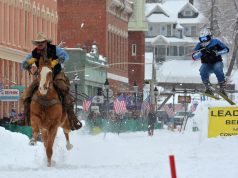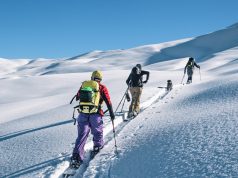
In mountain communities throughout Colorado, people are adopting “van life” as a means of recreation, but also quite often it’s out of necessity. For many of the people working in mountain towns (and especially in ski towns) owning a home is unattainable and renting one can be unaffordable. It’s a challenge that’s making the van lifestyle more popular by the year.
Van life alone won’t solve the mountain housing crisis, according to Matt Felser, cofounder of Dave and Matt Vans out of Gypsum, Colorado. In fact, he admits that it’s unfortunate that living in a vehicle is even being discussed as a necessary alternative to owning or renting property at all. But it can absolutely be part of the solution, he says—and his team is doing everything they can to make van life accessible to everyone.
Dave and Matt Vans is a custom lifestyle van building company started in 2019 by two college friends: Dave and Matt. Since then, they’ve grown their startup from just six employees to 28, and now they’re cranking out extremely affordable, quality-constructed vans. At their shop, Matt says they’re typically working on between four and eight vans at one time, and can complete a build in just two to three weeks.
Both Dave and Matt have lived the van life full time, and 10 of their employees currently live either part time or full time in vans.
“The reality is this is going to continue to grow,” Felser says. “The trend is here. We’ve run the numbers. More and more people are going to do this, whether it’s a part-time or full-time solution.”
The problem is, for anyone who’s chosen the van lifestyle, there aren’t many places to legally stay. Most neighborhoods, city streets, and business parking lots forbid people from sleeping in their vehicles overnight. That means van lifers either have to break the rules and squat illegally or drive miles out of town onto public land every night to settle down.
Some places have established “safe lots” that allow people experiencing homelessness or who’ve chosen to live in a van to have a safe place to stay for the night (see “Gaining Traction,” 11/19/2020). In Summit County, the Good Bridge Community has established a pilot program where Summit County interfaith church parking lots are available for overnight camping from 8 p.m. to 8 a.m. And here in Boulder County, Homeless Outreach Providing Encouragement (HOPE) is operating similar programs that turn local church parking lots into overnight campgrounds where approved campers can stay the night. Boulder’s “safe lots” are staffed and monitored all night long.
Dave and Matt Vans is hoping to start a similar pilot project up in the Vail Valley, to support all of the residents who are currently living out of their vans, trucks, or cars there. They’ve approached every town in the Vail Valley—Vail, Minturn, Avon, Edwards, Eagle, Gypsum—about establishing a program that would allow local businesses who opt in, turning their own parking lots into safe lots after-hours.
“Our original idea was a little bit more ambitious. We wanted to partner with public utilities like the public gym or the public parks,” Felser says. But they quickly realized that they would need some fairly significant legislative changes to make that a possibility. They’re still pursuing that route, Felser explains, just as “phase II” of this pilot.
“We settled on this private-public partnership, instead,” he says. “All we’re looking for is special permitting that would allow a business to get a permit that allows overnight parking in their own lot.”
That way, if an employee or a local is in need of a safe place to park their vehicular residence, they’ll have options that are right in town.
But, Felser continues, Dave and Matt Vans won’t be stopping there. They’re also reaching out to local businesses who want to offer employee housing but can’t afford it, and offering their vans as cost-effective alternatives. Felser points out the average rent in Vail is $1,500 a month (about the same as Boulder). Their vans can be financed for $629 a month, with zero dollars down—a much more realistic employee “housing” option for local businesses that could then be parked in permitted safe parking lots.
“The employee doesn’t need to go purchase the vehicle and [build] and finance it,” Felser says. “All of that the business could do, and then just offer it to the employees.”
He reiterates, though, that this represents just a possible piece of the housing crisis solution. It isn’t perfect, Felser says, but at least it offers people a chance to live a little more frugally without spending such a large portion of their salaries on rent, and possibly to save up enough money to actually become a homeowner themselves.
“We want to be able to spread this around the country, starting with our small valley here in Eagle County,” Felser says. “But ideally, we get this pilot program to go here, and then offer it to other places . . . we see it as something that is way easier to get off the ground than the other larger scale proposals.”














